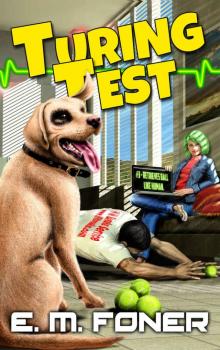- Home
- E. M. Foner
Turing Test Page 9
Turing Test Read online
Page 9
“I’m counting,” Ron grumbled, holding up his water glass and squinting at it as if that would help.
“Cover it with plastic wrap, put it on your tray, and drop it off at the bar when we go out,” I instructed him. “We can count after today’s lesson, and if I’m off by a single pea, I’ll give you thirty dollars. The duck has rested long enough, so everybody take one, and we’ll work on your tableside carving skills.”
“I thought they were chickens,” Sarah said, lifting up one of the heavy oval restaurant plates and examining the baked bird.
“Careful,” I warned her. They’re—”
She allowed the plate to tilt a few degrees while looking in my direction, and the duck shot off as if it were taking flight, then fell to the non-stick floor with a wet thud.
“—slippery,” I concluded my sentence. “Pick it up. We don’t have any spares.”
“I’m not serving floor-duck to customers,” she protested indignantly.
“You’ll carve it for my friends, they’re vegetarians,” I told her. “It’s not easy to find twenty people who want to eat duck with used green peas and left-over French fries at ten in the morning.”
“I was going to ask about that,” Janice said. “I thought we were going to have all of our lessons during regular business hours.”
“You are, as soon as you get by the crushed-peas and flying-ducks phase. It takes a couple of days for new students to settle in to the point where they won’t be in the way.”
“I’ve never even carved a chicken,” Daniela said nervously.
“The two most important things to remember are to always keep the fork in the bird while you’re carving, and never to stab the customers with the knife,” I told them. “You won’t see this sort of service locally, but it’s very common overseas. Any questions?”
“I’m afraid to pick it up now,” Sarah said, her duck looking a bit lopsided after its mishap.
I took pity on the girl. “Sprinkle some koshering salt on the plate. It’s a different principle than melting ice in the winter, but the grit will help hold the duck in place until you reach the table. Hey, that’s for her only,” I warned Ron, who was holding up one end of his duck with the carving fork and waiting for the salt to come around. “People are going to eat yours.”
“Sorry,” he said, letting the duck fall back to the plate.
“Now everybody move their duck to the tray, next to the bowl of fries. All right, share out the remaining peas between you, and don’t forget your carving sets. If you see the duck sliding off the plate, it means that you’re not looking where you’re going and it’s too late to do anything about it anyway. The last thing I want is for you to try to save the duck and end up launching your carving knife into space. Got it?”
“Now I understand why you made us practice carrying trays with tennis balls yesterday,” Brenda said.
“And you all did fine.” Spot wouldn’t be happy if he knew I’d taken a brief loan from the stash of tennis balls he kept in my office, but I was careful to put them back exactly where I found them. “Remember, elbows in, keep your palm under the tray, and let it rest on your shoulder if you feel it’s too heavy for your wrist.”
I shepherded my flock of students out into the dining room, and guided Sarah to the table where Helen and Stacey von Hoffman were sitting with Justin. Paul was apparently running late. The volunteer diners who were equipped with lungs held their collective breaths as the students lowered the trays onto the folding stands which had already been placed by each table. In most parts of the galaxy, restaurants deploy floating trays that are basically underpowered hoverboards, but folding stands get the job done as well.
“Did you drop the duck?” Stacey asked immediately.
Sarah turned bright red, but I whispered in her ear, “Don’t admit to a health department violation in front of witnesses. You never know who may be recording video on their phone these days.”
“I was just kidding,” Stacey reassured the mortified waitress. “Is this your first time doing Pharide table service?”
“Yes,” she answered, carefully turning the tray on the folding stand so that the duck was in front of her. “There. Who wants what?”
“I’ll have three peas,” Justin said. “If you can balance them all on a French fry, that would be good.”
“Sort of like an abstract representation of people in a canoe,” Helen said. “I’ll have to suggest food as a medium to my artist roommate.”
“You’re making me nervous standing there,” Sarah hissed in my direction after placing a fry on Justin’s plate and failing several times in a row to balance even a single pea on its surface.
“You can make little indentations to hold the peas with the point of your chopsticks,” I muttered before moving off to see how the other students were faring with our real customers.
“Morning, Mark,” the lieutenant said when I approached one of the police tables. “Nothing we like more than duck in the morning.”
“If I have to pay for this I’m filing a union grievance,” one of the patrolmen drafted into guinea pig duty warned the lieutenant. “I’m already using up my break time for this.”
“It’s on the house, gentlemen,” I informed them, grimacing as the sergeant reached over with his tablespoon and served his own peas. “Just tell Daniela what part of the duck you like.”
“Dark meat,” the lieutenant said. “I’ll take a drumstick and a thigh.”
“Together?” Daniela asked nervously.
“That’ll be fine,” he told her.
My student studied the duck for a moment and then turned the plate, positioning the knife to separate the back of the bird from the front.
“You have to cut at the joints,” I told her, gripping the top of the blade near the handle between my thumb and forefinger and guiding it to the right location. “Use the tip of the knife to separate the skin between the breast and the thigh before cutting deeply. And you’re poking big holes in the breast—move the carving fork back, to the stomach cavity.”
“Trial by fire, hey?” the second patrolman at the table commented. “I would have thought you’d have plastic birds out back to practice on, like a kid’s toy.”
“I’ve tried looking online without any luck,” I admitted, and then continued with the instructions. “Cut the skin between the breast and the thigh with the tip of the knife, that’s right, and now turn the blade a little to force the joint open. Carving fowl is different from carving a roast in that you rarely cut straight down with a sawing motion. It’s more about finding the joints and plating the pieces. Go gently with the knife. If you have to push hard, you’re on the bone and not the joint.”
She looked up triumphantly as the thigh with the leg fell away from the duck.
“Perfect. In a different type of table service, you’d carve the whole bird and move the pieces to a platter before serving, but we’re working without the intermediate step. Just open the joint between the drumstick and the thigh before moving it to the customer’s plate.”
“I stick the knife in here?”
“Try to imagine a line extending from the bone at the end of the drumstick, the ankle, running straight up, and another line coming through the end of the thighbone. They meet at the joint. Just probe for it with the tip of the knife and cut through, you should feel a little crunch. Try to leave the skin as intact as possible. This step just makes it easier for the customer to manage.”
Daniela wore an intense frown as she prodded for the joint, but eventually she got it and put down the knife. “Here you are,” she said, stabbing the duck’s thigh with her carving fork and brandishing it like a trophy before extending it out over the lieutenant’s plate. She gave a little shake to see if it would slide off on its own, but one of the tines was up against a bone.
“Okay, one small criticism,” I told her. “You should serve with the carving fork under the piece and use a gravy spoon to hold it in place.”
“Got it,” she
said, and then used the back of the carving knife to scrape duck off the fork and onto the lieutenant’s plate. He playfully fended away the point of the knife with his own.
“What did you just do wrong?” I asked her patiently.
“I got the duck stuck on the carving fork.”
“And what did I tell you about pointing knives at the customers?”
“Oh, sorry,” she said, still holding the knife in her hand as if she were considering a sudden lunge. “Who else wants some of this?”
The four policemen raised their hands in mock surrender. I glanced around the dining room to check on the progress of the other students and then called a temporary halt to the proceedings. “Everybody over here, please. No, just the students, not the diners,” I had to add as sixteen chairs scraped back from the tables. “This will only take a minute. Daniela? You’re going to demonstrate to the others how to separate the breast and wing from the carcass.”
“I’ve always seen it sliced in place,” Ron said, and the others all backed him up.
“That’s fine for turkeys or particularly large birds, but we serve young hens and ducks in quarters,” I explained, and then began to coach Daniela through the process. “Find the soft bone at the center of the breast and run your knife alongside, but gently—you don’t want to cut through the ribs. That’s right, use the side of the blade to separate the meat from the carcass, and now follow along as the ribs curve out. Very good. Does everybody get it?”
“So we can’t serve slices even if the customers want us to?” Sarah asked.
“The customer isn’t always right,” I told her. “As waitstaff, it’s your job to present them with options, not to cater to every whim. When in doubt, think of what a French waiter would do.”
“I thought the customer was always right,” Daniela said as she moved the breast to the closer patrolman’s plate, holding it from below with the carving fork and keeping it steady with a tablespoon.
“That’s because you used to work in retail. Food service is different.” The phone vibrated in my pocket and I pulled it out for a quick peek. It was a text message from eBeth, who knew better than to call me while I was teaching a class. Somebody was at the front door of my apartment fiddling with the lock. I texted her back to stay put and not to open the door before I got there.
“Sorry I’m late,” Paul announced himself, slipping past me and taking his seat with the other team members I’d drafted to make up the number of tables. “Floor-duck again?”
“You’re just in time,” I told him, and then addressed the room at large. “I want to thank everybody again for coming and to remind you all to save room for dessert, which I’m sure is the reason most of you are here. An emergency just came up with my other business, but Paul will be standing in for me and completing the lesson. Paul?”
You owe me for this, he grumbled electronically. Let’s have it.
I dropped a massive data dump including everything I knew about dessert service on him and made a beeline for the door. Behind me, I heard him saying, “Looks like Mark started you all off on Pharide service. Now let’s imagine for a moment that your customers are all octopi…”
Ten
Thanks to the lack of mid-morning traffic, I made it back to the apartment building in ten minutes flat and silently climbed the stairs. eBeth texted me a steady stream of updates, so I wasn’t surprised to find the would-be intruder still kneeling in front of my door when I reached the landing. At this point she appeared to have given up in frustration and was struggling to extract a stuck lock-pick.
“May I ask what you’re doing,” I inquired politely.
The woman froze, and then slowly rose while turning, placing one hand in her purse. I hoped she wasn’t about to pepper-spray me because Spot would probably refuse to be in the same room with my encounter suit for a week.
“I locked myself out of my apartment,” she lied smoothly.
“I’m afraid this is my apartment.”
“Isn’t this the fifth floor?”
“I know everybody who lives in this building and you aren’t one of us.”
“I must have turned down the wrong block,” she said, edging towards the stairs. “You know how this planned housing all looks the same.”
“Who are you?” I asked again, keeping my voice pleasant as I barred her way with one arm. “It’s all right, eBeth,” I called loudly. “You can open up now.”
I heard the girl rattle the knob for a moment, then the pick fell out and the door pulled open.
“Why don’t you join us inside?” I suggested to the woman, though this time I used the same tone of voice I took with people who abused their computers.
“You bet I will,” she said, suddenly turning aggressive and literally pushing past me into the apartment. “What has he done to you?” she asked eBeth in a much softer voice. “I’m a reporter, and I can help you.”
“Do you mean—gross,” eBeth said, turning the same shade of pink as her latest hair color.
“Where’s Spot?” I asked, closing the door behind me as I entered.
“I locked him in the bedroom so he wouldn’t bark and scare her away. I thought she was just a burglar and you might want to meet one.”
“It would take more than a barking dog to scare me away from this story,” the reporter said, straightening up and staring at me like I was the one who had been caught trying to break into her home. “I’m sure you know why I’m here, Mr. Ai, and your choice of a fake name just shows that some part of you is begging to be caught.”
“You have caught me,” I said, folding my arms across my chest. “I’m running a sole proprietorship under a made-up name without having filed a Doing-Business-As certificate at town hall. It’s a waste of fifty bucks, and then they give you grief about business use of the home in subsidized housing.”
“What?” She looked genuinely puzzled. “I was talking about the fact that Ai is a common first name for females in Japan. I assumed you picked it up from looking at dirty pictures on the Internet.”
“Mark doesn’t look at—” eBeth began, then clammed up when she remembered that I was passing as human.
“I just came from a duck brunch with most of the police force,” I informed the reporter, introducing a carefully calibrated amount of anger into my own tone. “Tell me why I shouldn’t call them right now to come pick you up.”
“You do that,” she said. “The police were my next stop in exposing your little white slavery ring, and—don’t try it!” she shouted, pulling out a Taser and pointing it at me as I reached in my pocket for the vibrating phone. “I’ve been investigating your so-called training restaurant since October and I’ve documented fourteen young women who have gone missing.”
“You missed a dozen, and that’s not even counting the men,” I told her, then took advantage of her momentary shock to finish pulling out my phone without getting zapped. I held up the index finger on my left hand requesting a timeout. “If It Breaks Service. Mark speaking.”
“Hi, Mark. You’ve won two free nights in the Edgewater—” I hung up in disgust on the invitation to a special showing for a time-share condominium. I’d rather be tased.
“So you admit it!” the reporter said. She whipped out her own phone, so I was now facing down both a Taser and a cracked iPhone screen. “This whole conversation is being live-streamed on Facebook.”
“No, it’s not,” eBeth observed. “Did you actually try navigating those menus without looking?”
The reporter twisted her wrist and let her eyes flicker to the phone for a split second, and then back again to confirm the bad news. Her posture wilted a little. “I’ve got a back-up mini-cassette running in my purse,” she said.
“You’re very well prepared,” I complimented her, hoping to de-escalate the situation. “What’s your name?”
“Emily. Emily Fox.”
“From the Townie. I read your paper.”
“I’m sure you spend a lot of time searching the personal ad
s for new victims.”
“Double eww,” eBeth said. “Stop it with the icky stuff, lady. He’s not like that.”
“Nobody has been kidnapping anybody, at least not in my restaurant,” I assured the reporter. “My graduates and employees are an adventurous bunch, and they make the most of their opportunities to travel.”
The bedroom door banged open as Spot finally got the knob to turn, and he flew over the couch in a single bound, skidding to a halt on the fake hardwood flooring when he spotted the Taser. Unfortunately, our uninvited guest was so freaked out that she reflexively pointed at him and pulled the trigger. I saw it coming and moved quickly to grab the electrodes out of the air, draining the charge into my backup cell.
“I didn’t mean that,” Emily said, looking somewhat abashed by the turn of events. “I would never intentionally shoot a dog.”
“No harm, no foul,” I told her, reaching out my other hand for the now useless Taser. “I’ll take care of that, you make up with Spot.”
The dog wasn’t growling, though his feelings towards the reporter must have shifted from welcoming to neutral when she attempted to electrocute him. But Spot was a good-natured creature and Emily must have smelled nice. He approached carefully, keeping one eye on her phone for suspicious movements, and then head-butted her hip for attention. The reporter reached down and began rubbing his back, obviously a dog person.
“Listen,” I said. “I’m afraid we got off on the wrong foot here, but if Spot’s willing to forgive you for trying to shoot him, I guess we can do the same.”
“But no more weird accusations,” eBeth put in.
“Maybe I’ve misread the situation, but you have to admit that it looks pretty suspicious,” the reporter said, her eyes traveling to eBeth again. I realized that the girl was still in her pajamas and sighed.
“eBeth, go home and put some real clothes on.”

 Last Night on Union Station (EarthCent Ambassador Book 16)
Last Night on Union Station (EarthCent Ambassador Book 16) Empire Night on Union Station (EarthCent Ambassador Book 18)
Empire Night on Union Station (EarthCent Ambassador Book 18) Space Living (EarthCent Universe Book 4)
Space Living (EarthCent Universe Book 4) Review Night on Union Station (EarthCent Ambassador Book 11)
Review Night on Union Station (EarthCent Ambassador Book 11) Assisted Living
Assisted Living Con Living
Con Living Freelance On The Galactic Tunnel Network
Freelance On The Galactic Tunnel Network Career Night on Union Station
Career Night on Union Station Career Night on Union Station (EarthCent Ambassador Book 15)
Career Night on Union Station (EarthCent Ambassador Book 15) Word Night on Union Station (EarthCent Ambassador Book 9)
Word Night on Union Station (EarthCent Ambassador Book 9) Soup Night on Union Station
Soup Night on Union Station Human Test
Human Test Spy Night on Union Station (EarthCent Ambassador Book 4)
Spy Night on Union Station (EarthCent Ambassador Book 4) Family Night on Union Station (EarthCent Ambassador Book 12)
Family Night on Union Station (EarthCent Ambassador Book 12) Party Night on Union Station (EarthCent Ambassador Book 10)
Party Night on Union Station (EarthCent Ambassador Book 10) Turing Test
Turing Test Alien Night on Union Station (EarthCent Ambassador Book 2)
Alien Night on Union Station (EarthCent Ambassador Book 2) Wanderers On Union Station (EarthCent Ambassador Book 6)
Wanderers On Union Station (EarthCent Ambassador Book 6) Vacation on Union Station (EarthCent Ambassador Book 7)
Vacation on Union Station (EarthCent Ambassador Book 7) Book Night on Union Station (EarthCent Ambassasor 13)
Book Night on Union Station (EarthCent Ambassasor 13) LARP Night on Union Station
LARP Night on Union Station Carnival On Union Station (EarthCent Ambassador Book 5)
Carnival On Union Station (EarthCent Ambassador Book 5) LARP Night on Union Station (EarthCent Ambassador Book 14)
LARP Night on Union Station (EarthCent Ambassador Book 14) Book Night on Union Station
Book Night on Union Station High Priest on Union Station (EarthCent Ambassador Book 3)
High Priest on Union Station (EarthCent Ambassador Book 3) Meghan's Dragon
Meghan's Dragon Human Test (AI Diaries Book 2)
Human Test (AI Diaries Book 2) Guest Night on Union Station
Guest Night on Union Station Date Night on Union Station
Date Night on Union Station